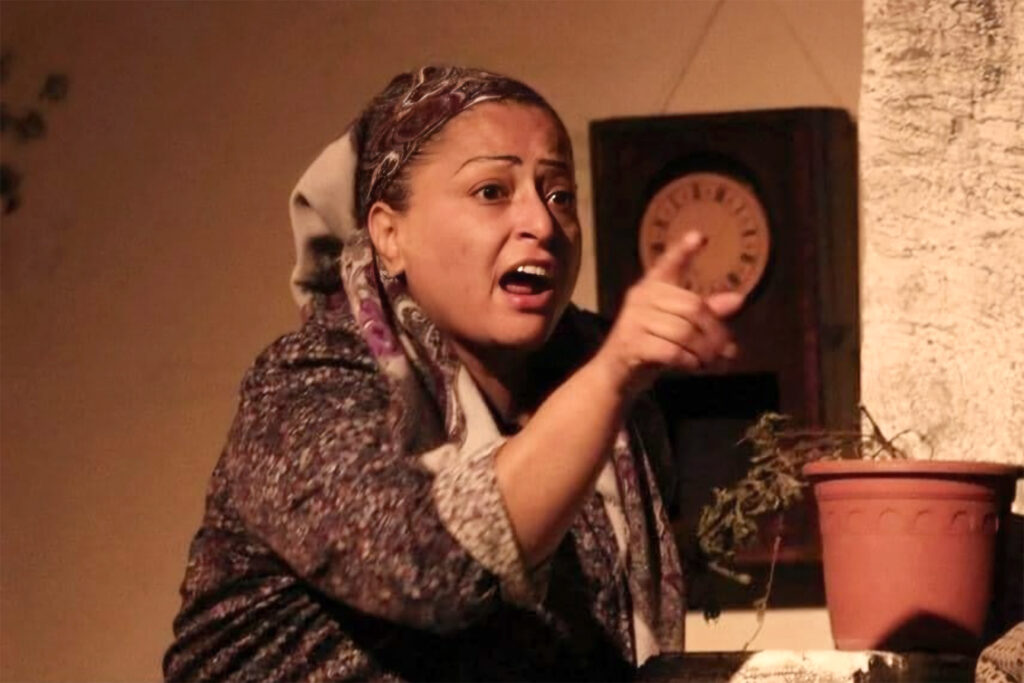The prominent Palestinian artist, Reem Al-Lu, passed away after a struggle with illness, leaving a huge void in the Palestinian theatrical scene.
The “Palestinian National Theater – Al-Hakawati” page announced on Facebook that the funeral of the late artist was held today, Saturday, in the city of Jerusalem. Her family will receive condolences at her family home in Kafr Aqab for 3 days.
Palestinian actor Kamel Al-Basha was keen to mourn her by publishing a picture of himself with the late artist in one of the theatrical productions, and wrote, “Loved ones leave and their memory remains, amid all the death surrounding a people (her people). Death has another meaning that only those who truly died can understand.”
The Palestinian Popular Theater Association also mourned the late artist via Facebook and wrote: “With more sadness and sorrow, the Popular Theater Association mourns fellow artist and board member, Reem Al-Lu, as she had a distinguished presence on the artistic scene through the plays and artistic works in which she participated and provided an addition to art and the image of women.” In the theatrical scene and cultural life, her fragrant memory will be immortalized.”
Palestinian artist Abeer Sansour wrote: “With aggrieved hearts and indescribable pain, today we bid farewell to our dear friend Reem Al-Lu. We will never forget your beautiful soul and the light that lights up the stage.”
The artist Abeer added, “You left your deep mark in the hearts of everyone who knew you. I will never forget the most beautiful days we spent together while filming the series (The Strange Brothers). You were a sister and friend to everyone, and your free spirit never knew how to give up. Farewell, Reem. You will always remain in our hearts.”
The artist, Shaden Salem, mourned her and wrote, “The good ones leave early. The beautiful artist, Reem Al-Lou, has passed away.”
Art, creativity and resistance
Reem Al-Lu, who was born in Jerusalem, grew up with a love of art since her childhood. At the age of five, she used to climb the garbage barrel near her home to impersonate different characters she saw on television. She enjoyed a beautiful voice, which she developed by studying until she obtained a bachelor’s degree in music education.
In one of the interviews, she mentioned that everyone who heard her sing at school events or concerts noticed the beauty of her voice, and she explained that her beautiful voice was her gateway to acting professionally in theater, television, and cinema. Lou began her artistic career in the late 1980s, and over the decades she performed about 30 theatrical works.
Her roles reflected the specificity of the Palestinian people. She believed that creativity and culture were a form of resistance, and that art embodied human and life situations, which was clearly reflected in her works.
Al-Lu also defended women’s issues in her works, as she believed that women are no less important than men in Palestine, as they are also in a state of struggle. Just as a man carries out a guerrilla operation, a woman carries out resistance by raising her children to become men.
Palestinian artist Reem Al-Lu played the character of the mother of the Jordanian writer Ghaleb Hilsa in the series “Sultana,” and participated in prominent dramatic works such as “The Flood Notebooks.”
In the series “Sons of the Castle,” directed by Iyad Nahas, the story dealt with the identity of the modern city of Amman, which it acquired from diverse origins including Jordanians, Palestinians, and Syrians during the period from the 1940s until 1967.
Among her most prominent theatrical works are “The Stolen Shirt” by Ghassan Kanafani and produced by Al-Hakawati Theater in Jerusalem, “Jinan Um Jarabat Twal” produced by the Freedom Theater in Jenin Camp, and “Abu Al-Khayzuran’s Journeys” produced by the Popular Theater in Al-Amari Refugee Camp.
Among the most prominent of them is “Qamar and Sanabel,” produced by the Weshah Folk Dance Troupe. She also participated in the play “Democratic with Wellness,” directed by Walid Abdel Salam, “Democratic But,” directed by Ahmed Abu Saloum, and “Uninterrupted Words,” directed by Dirar Suleiman, and other plays.
She also participated with Tunisian director Shawqi Al Majri in the series “The Invasion,” which dealt with the terrorism practiced by the occupation against the Palestinian people.
In 2000, she embodied one of the characters in the series “The Long Path” with director Salah Abu Hanoud. The series’ events revolve around the suffering that Palestinian society experiences under occupation, through a poor Palestinian family suffering from a difficult life during the British occupation and after it the Israeli occupation of Palestine.
Reem Al-Lao also presented cinematic experiences, including the film “Ticket to Jerusalem” by director Rashid Masharawi, and the film “Shwaish Shawish” by director Riad Dais. She released two albums with Palestinian singing groups. In 2022, the Palestine National Theater Festival honored her for her artistic career.
Reem Al-Lu’s latest work was her participation in the fourth part of the series “Bab Al-Amoud”, a satirical comedy series produced and written by Ismail Al-Dabbagh, which highlights the Judaization attempts imposed by the occupation on the Palestinian city of Jerusalem.
Reem Al-Lu’s interest in the situation in Palestine was reflected during her dramatic works in which she participated, which dealt with the Palestinian issue with different treatments. Reem considered that the Palestinian artist must remain in contact with the internal situation, and the social, economic, and humanitarian situation under occupation cannot be separated from the political situation.

